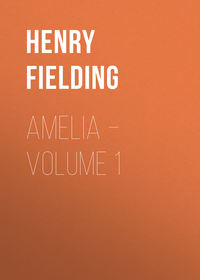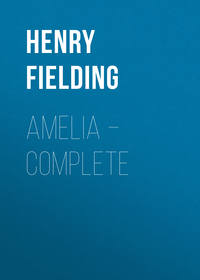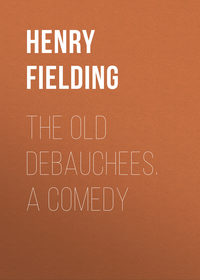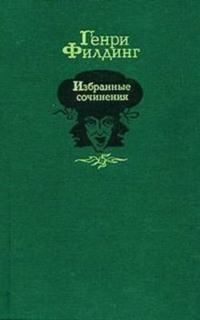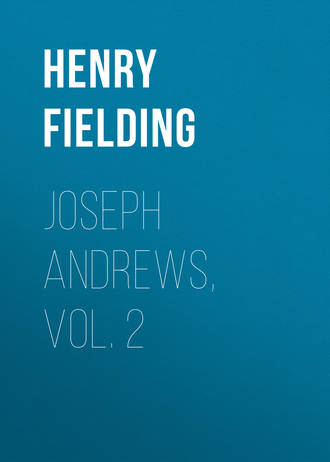
Joseph Andrews, Vol. 2
Fanny, being recovered from her confusion, which was almost equalled by what Joseph had felt from observing it, again mentioned her request; this was instantly and gladly complied with; and together they crossed two or three fields, which brought them to the habitation of Mr Adams.
CHAPTER VIII.
A discourse which happened between Mr Adams, Mrs Adams, Joseph, and Fanny; with some behaviour of Mr Adams which will be called by some few readers very low, absurd, and unnatural
The parson and his wife had just ended a long dispute when the lovers came to the door. Indeed, this young couple had been the subject of the dispute; for Mrs Adams was one of those prudent people who never do anything to injure their families, or, perhaps, one of those good mothers who would even stretch their conscience to serve their children. She had long entertained hopes of seeing her eldest daughter succeed Mrs Slipslop, and of making her second son an exciseman by Lady Booby's interest. These were expectations she could not endure the thoughts of quitting, and was, therefore, very uneasy to see her husband so resolute to oppose the lady's intention in Fanny's affair. She told him, "It behoved every man to take the first care of his family; that he had a wife and six children, the maintaining and providing for whom would be business enough for him without intermeddling in other folks' affairs; that he had always preached up submission to superiors, and would do ill to give an example of the contrary behaviour in his own conduct; that if Lady Booby did wrong she must answer for it herself, and the sin would not lie at their door; that Fanny had been a servant, and bred up in the lady's own family, and consequently she must have known more of her than they did, and it was very improbable, if she had behaved herself well, that the lady would have been so bitterly her enemy; that perhaps he was too much inclined to think well of her because she was handsome, but handsome women were often no better than they should be; that G – made ugly women as well as handsome ones; and that if a woman had virtue it signified nothing whether she had beauty or no." For all which reasons she concluded he should oblige the lady, and stop the future publication of the banns. But all these excellent arguments had no effect on the parson, who persisted in doing his duty without regarding the consequence it might have on his worldly interest. He endeavoured to answer her as well as he could; to which she had just finished her reply (for she had always the last word everywhere but at church) when Joseph and Fanny entered their kitchen, where the parson and his wife then sat at breakfast over some bacon and cabbage. There was a coldness in the civility of Mrs Adams which persons of accurate speculation might have observed, but escaped her present guests; indeed, it was a good deal covered by the heartiness of Adams, who no sooner heard that Fanny had neither eat nor drank that morning than he presented her a bone of bacon he had just been gnawing, being the only remains of his provision, and then ran nimbly to the tap, and produced a mug of small beer, which he called ale; however, it was the best in his house. Joseph, addressing himself to the parson, told him the discourse which had past between Squire Booby, his sister, and himself concerning Fanny; he then acquainted him with the dangers whence he had rescued her, and communicated some apprehensions on her account. He concluded that he should never have an easy moment till Fanny was absolutely his, and begged that he might be suffered to fetch a licence, saying he could easily borrow the money. The parson answered, That he had already given his sentiments concerning a licence, and that a very few days would make it unnecessary. "Joseph," says he, "I wish this haste doth not arise rather from your impatience than your fear; but, as it certainly springs from one of these causes, I will examine both. Of each of these therefore in their turn; and first for the first of these, namely, impatience. Now, child, I must inform you that, if in your purposed marriage with this young woman you have no intention but the indulgence of carnal appetites, you are guilty of a very heinous sin. Marriage was ordained for nobler purposes, as you will learn when you hear the service provided on that occasion read to you. Nay, perhaps, if you are a good lad, I, child, shall give you a sermon gratis, wherein I shall demonstrate how little regard ought to be had to the flesh on such occasions. The text will be Matthew the 5th, and part of the 28th verse-Whosoever looketh on a woman, so as to lust after her. The latter part I shall omit, as foreign to my purpose. Indeed, all such brutal lusts and affections are to be greatly subdued, if not totally eradicated, before the vessel can be said to be consecrated to honour. To marry with a view of gratifying those inclinations is a prostitution of that holy ceremony, and must entail a curse on all who so lightly undertake it. If, therefore, this haste arises from impatience, you are to correct, and not give way to it. Now, as to the second head which I proposed to speak to, namely, fear: it argues a diffidence, highly criminal, of that Power in which alone we should put our trust, seeing we may be well assured that he is able, not only to defeat the designs of our enemies, but even to turn their hearts. Instead of taking, therefore, any unjustifiable or desperate means to rid ourselves of fear, we should resort to prayer only on these occasions; and we may be then certain of obtaining what is best for us. When any accident threatens us we are not to despair, nor, when it overtakes us, to grieve; we must submit in all things to the will of Providence, and set our affections so much on nothing here that we cannot quit it without reluctance. You are a young man, and can know but little of this world; I am older, and have seen a great deal. All passions are criminal in their excess; and even love itself, if it is not subservient to our duty, may render us blind to it. Had Abraham so loved his son Isaac as to refuse the sacrifice required, is there any of us who would not condemn him? Joseph, I know your many good qualities, and value you for them; but, as I am to render an account of your soul, which is committed to my cure, I cannot see any fault without reminding you of it. You are too much inclined to passion, child, and have set your affections so absolutely on this young woman, that, if G – required her at your hands, I fear you would reluctantly part with her. Now, believe me, no Christian ought so to set his heart on any person or thing in this world, but that, whenever it shall be required or taken from him in any manner by Divine Providence, he may be able, peaceably, quietly, and contentedly to resign it." At which words one came hastily in, and acquainted Mr Adams that his youngest son was drowned. He stood silent a moment, and soon began to stamp about the room and deplore his loss with the bitterest agony. Joseph, who was overwhelmed with concern likewise, recovered himself sufficiently to endeavour to comfort the parson; in which attempt he used many arguments that he had at several times remembered out of his own discourses, both in private and public (for he was a great enemy to the passions, and preached nothing more than the conquest of them by reason and grace), but he was not at leisure now to hearken to his advice. "Child, child," said he, "do not go about impossibilities. Had it been any other of my children I could have borne it with patience; but my little prattler, the darling and comfort of my old age – the little wretch, to be snatched out of life just at his entrance into it; the sweetest, best-tempered boy, who never did a thing to offend me. It was but this morning I gave him his first lesson in Que Genus. This was the very book he learnt; poor child! it is of no further use to thee now. He would have made the best scholar, and have been an ornament to the Church; – such parts and such goodness never met in one so young." "And the handsomest lad too," says Mrs Adams, recovering from a swoon in Fanny's arms. "My poor Jacky, shall I never see thee more?" cries the parson. "Yes, surely," says Joseph, "and in a better place; you will meet again, never to part more." I believe the parson did not hear these words, for he paid little regard to them, but went on lamenting, whilst the tears trickled down into his bosom. At last he cried out, "Where is my little darling?" and was sallying out, when to his great surprize and joy, in which I hope the reader will sympathize, he met his son in a wet condition indeed, but alive and running towards him. The person who brought the news of his misfortune had been a little too eager, as people sometimes are, from, I believe, no very good principle, to relate ill news; and, seeing him fall into the river, instead of running to his assistance, directly ran to acquaint his father of a fate which he had concluded to be inevitable, but whence the child was relieved by the same poor pedlar who had relieved his father before from a less distress. The parson's joy was now as extravagant as his grief had been before; he kissed and embraced his son a thousand times, and danced about the room like one frantic; but as soon as he discovered the face of his old friend the pedlar, and heard the fresh obligation he had to him, what were his sensations? not those which two courtiers feel in one another's embraces; not those with which a great man receives the vile treacherous engines of his wicked purposes, not those with which a worthless younger brother wishes his elder joy of a son, or a man congratulates his rival on his obtaining a mistress, a place, or an honour. – No, reader; he felt the ebullition, the overflowings of a full, honest, open heart, towards the person who had conferred a real obligation, and of which, if thou canst not conceive an idea within, I will not vainly endeavour to assist thee.
When these tumults were over, the parson, taking Joseph aside, proceeded thus – "No, Joseph, do not give too much way to thy passions, if thou dost expect happiness." The patience of Joseph, nor perhaps of Job, could bear no longer; he interrupted the parson, saying, "It was easier to give advice than take it; nor did he perceive he could so entirely conquer himself, when he apprehended he had lost his son, or when he found him recovered." – "Boy," replied Adams, raising his voice, "it doth not become green heads to advise grey hairs. – Thou art ignorant of the tenderness of fatherly affection; when thou art a father thou wilt be capable then only of knowing what a father can feel. No man is obliged to impossibilities; and the loss of a child is one of those great trials where our grief may be allowed to become immoderate." – "Well, sir," cries Joseph, "and if I love a mistress as well as you your child, surely her loss would grieve me equally." – "Yes, but such love is foolishness and wrong in itself, and ought to be conquered," answered Adams; "it savours too much of the flesh." – "Sure, sir," says Joseph, "it is not sinful to love my wife, no, not even to doat on her to distraction!" – "Indeed but it is," says Adams. "Every man ought to love his wife, no doubt; we are commanded so to do; but we ought to love her with moderation and discretion." – "I am afraid I shall be guilty of some sin in spite of all my endeavours," says Joseph; "for I shall love without any moderation, I am sure." – "You talk foolishly and childishly," cries Adams. – "Indeed," says Mrs Adams, who had listened to the latter part of their conversation, "you talk more foolishly yourself. I hope, my dear, you will never preach any such doctrine as that husbands can love their wives too well. If I knew you had such a sermon in the house I am sure I would burn it, and I declare, if I had not been convinced you had loved me as well as you could, I can answer for myself, I should have hated and despised you. Marry come up! Fine doctrine, indeed! A wife hath a right to insist on her husband's loving her as much as ever he can; and he is a sinful villain who doth not. Doth he not promise to love her, and to comfort her, and to cherish her, and all that? I am sure I remember it all as well as if I had repeated it over but yesterday, and shall never forget it. Besides, I am certain you do not preach as you practise; for you have been a loving and a cherishing husband to me; that's the truth on't; and why you should endeavour to put such wicked nonsense into this young man's head I cannot devise. Don't hearken to him, Mr Joseph; be as good a husband as you are able, and love your wife with all your body and soul too." Here a violent rap at the door put an end to their discourse, and produced a scene which the reader will find in the next chapter.
CHAPTER IX.
A visit which the polite Lady Booby and her polite friend paid to the parson
The Lady Booby had no sooner had an account from the gentleman of his meeting a wonderful beauty near her house, and perceived the raptures with which he spoke of her, than, immediately concluding it must be Fanny, she began to meditate a design of bringing them better acquainted; and to entertain hopes that the fine clothes, presents, and promises of this youth, would prevail on her to abandon Joseph: she therefore proposed to her company a walk in the fields before dinner, when she led them towards Mr Adams's house; and, as she approached it, told them if they pleased she would divert them with one of the most ridiculous sights they had ever seen, which was an old foolish parson, who, she said, laughing, kept a wife and six brats on a salary of about twenty pounds a year; adding, that there was not such another ragged family in the parish. They all readily agreed to this visit, and arrived whilst Mrs Adams was declaiming as in the last chapter. Beau Didapper, which was the name of the young gentleman we have seen riding towards Lady Booby's, with his cane mimicked the rap of a London footman at the door. The people within, namely, Adams, his wife and three children, Joseph, Fanny, and the pedlar, were all thrown into confusion by this knock, but Adams went directly to the door, which being opened, the Lady Booby and her company walked in, and were received by the parson with about two hundred bows, and by his wife with as many curtsies; the latter telling the lady "She was ashamed to be seen in such a pickle, and that her house was in such a litter; but that if she had expected such an honour from her ladyship she should have found her in a better manner." The parson made no apologies, though he was in his half-cassock and a flannel nightcap. He said "They were heartily welcome to his poor cottage," and turning to Mr Didapper, cried out, "Non mea renidet in domo lacunar." The beau answered, "He did not understand Welsh;" at which the parson stared and made no reply.
Mr Didapper, or beau Didapper, was a young gentleman of about four foot five inches in height. He wore his own hair, though the scarcity of it might have given him sufficient excuse for a periwig. His face was thin and pale; the shape of his body and legs none of the best, for he had very narrow shoulders and no calf; and his gait might more properly be called hopping than walking. The qualifications of his mind were well adapted to his person. We shall handle them first negatively. He was not entirely ignorant; for he could talk a little French and sing two or three Italian songs; he had lived too much in the world to be bashful, and too much at court to be proud: he seemed not much inclined to avarice, for he was profuse in his expenses; nor had he all the features of prodigality, for he never gave a shilling: no hater of women, for he always dangled after them; yet so little subject to lust, that he had, among those who knew him best, the character of great moderation in his pleasures; no drinker of wine; nor so addicted to passion but that a hot word or two from an adversary made him immediately cool.
Now, to give him only a dash or two on the affirmative side: though he was born to an immense fortune, he chose, for the pitiful and dirty consideration of a place of little consequence, to depend entirely on the will of a fellow whom they call a great man; who treated him with the utmost disrespect, and exacted of him a plenary obedience to his commands, which he implicitly submitted to, at the expense of his conscience, his honour, and of his country, in which he had himself so very large a share. And to finish his character; as he was entirely well satisfied with his own person and parts, so he was very apt to ridicule and laugh at any imperfection in another. Such was the little person, or rather thing, that hopped after Lady Booby into Mr Adams's kitchen.
The parson and his company retreated from the chimney-side, where they had been seated, to give room to the lady and hers. Instead of returning any of the curtsies or extraordinary civility of Mrs Adams, the lady, turning to Mr Booby, cried out, "Quelle Bête! Quel Animal!" And presently after discovering Fanny (for she did not need the circumstance of her standing by Joseph to assure the identity of her person), she asked the beau "Whether he did not think her a pretty girl?" – "Begad, madam," answered he, "'tis the very same I met." "I did not imagine," replied the lady, "you had so good a taste." – "Because I never liked you, I warrant," cries the beau. "Ridiculous!" said she: "you know you was always my aversion." "I would never mention aversion," answered the beau, "with that face5; dear Lady Booby, wash your face before you mention aversion, I beseech you." He then laughed, and turned about to coquet it with Fanny.
Mrs Adams had been all this time begging and praying the ladies to sit down, a favour which she at last obtained. The little boy to whom the accident had happened, still keeping his place by the fire, was chid by his mother for not being more mannerly: but Lady Booby took his part, and, commending his beauty, told the parson he was his very picture. She then, seeing a book in his hand, asked "If he could read?" – "Yes," cried Adams, "a little Latin, madam: he is just got into Quae Genus." – "A fig for quere genius!" answered she; "let me hear him read a little English." – "Lege, Dick, lege," said Adams: but the boy made no answer, till he saw the parson knit his brows, and then cried, "I don't understand you, father." – "How, boy!" says Adams; "what doth lego make in the imperative mood? Legito, doth it not?" – "Yes," answered Dick. – "And what besides ?" says the father. "Lege," quoth the son, after some hesitation. "A good boy," says the father: "and now, child, what is the English of lego?" – To which the boy, after long puzzling, answered, he could not tell. "How!" cries Adams, in a passion; – "what, hath the water washed away your learning? Why, what is Latin for the English verb read? Consider before you speak." The child considered some time, and then the parson cried twice or thrice, "Le – , Le – ." Dick answered, "Lego." – "Very well; – and then what is the English," says the parson, "of the verb lego?" – "To read," cried Dick. – "Very well," said the parson; "a good boy: you can do well if you will take pains. – I assure your ladyship he is not much above eight years old, and is out of his Propria quae Maribus already. – Come, Dick, read to her ladyship;" – which she again desiring, in order to give the beau time and opportunity with Fanny, Dick began as in the following chapter.
CHAPTER X.
The history of two friends, which may afford an useful lesson to all those persons who happen to take up their residence in married families
"Leonard and Paul were two friends." – "Pronounce it Lennard, child," cried the parson. – "Pray, Mr Adams," says Lady Booby, "let your son read without interruption." Dick then proceeded. "Lennard and Paul were two friends, who, having been educated together at the same school, commenced a friendship which they preserved a long time for each other. It was so deeply fixed in both their minds, that a long absence, during which they had maintained no correspondence, did not eradicate nor lessen it: but it revived in all its force at their first meeting, which was not till after fifteen years' absence, most of which time Lennard had spent in the East Indi-es." – "Pronounce it short, Indies," says Adams. – "Pray? sir, be quiet," says the lady. – The boy repeated – "in the East Indies, whilst Paul had served his king and country in the army. In which different services they had found such different success, that Lennard was now married, and retired with a fortune of thirty thousand pounds; and Paul was arrived to the degree of a lieutenant of foot; and was not worth a single shilling.
"The regiment in which Paul was stationed happened to be ordered into quarters within a small distance from the estate which Lennard had purchased, and where he was settled. This latter, who was now become a country gentleman, and a justice of peace, came to attend the quarter sessions in the town where his old friend was quartered, soon after his arrival. Some affair in which a soldier was concerned occasioned Paul to attend the justices. Manhood, and time, and the change of climate had so much altered Lennard, that Paul did not immediately recollect the features of his old acquaintance: but it was otherwise with Lennard. He knew Paul the moment he saw him; nor could he contain himself from quitting the bench, and running hastily to embrace him. Paul stood at first a little surprized; but had soon sufficient information from his friend, whom he no sooner remembered than he returned his embrace with a passion which made many of the spectators laugh, and gave to some few a much higher and more agreeable sensation.
"Not to detain the reader with minute circumstances, Lennard insisted on his friend's returning with him to his house that evening; which request was complied with, and leave for a month's absence for Paul obtained of the commanding officer.
"If it was possible for any circumstance to give any addition to the happiness which Paul proposed in this visit, he received that additional pleasure by finding, on his arrival at his friend's house, that his lady was an old acquaintance which he had formerly contracted at his quarters, and who had always appeared to be of a most agreeable temper; a character she had ever maintained among her intimates, being of that number, every individual of which is called quite the best sort of woman in the world.
"But, good as this lady was, she was still a woman; that is to say, an angel, and not an angel." – "You must mistake, child," cries the parson, "for you read nonsense." – "It is so in the book," answered the son. Mr Adams was then silenced by authority, and Dick proceeded – "For though her person was of that kind to which men attribute the name of angel, yet in her mind she was perfectly woman. Of which a great degree of obstinacy gave the most remarkable and perhaps most pernicious instance.
"A day or two passed after Paul's arrival before any instances of this appeared; but it was impossible to conceal it long. Both she and her husband soon lost all apprehension from their friend's presence, and fell to their disputes with as much vigour as ever. These were still pursued with the utmost ardour and eagerness, however trifling the causes were whence they first arose. Nay, however incredible it may seem, the little consequence of the matter in debate was frequently given as a reason for the fierceness of the contention, as thus: 'If you loved me, sure you would never dispute with me such a trifle as this.' The answer to which is very obvious; for the argument would hold equally on both sides, and was constantly retorted with some addition, as – 'I am sure I have much more reason to say so, who am in the right.' During all these disputes, Paul always kept strict silence, and preserved an even countenance, without showing the least visible inclination to either party. One day, however, when madam had left the room in a violent fury, Lennard could not refrain from referring his cause to his friend. Was ever anything so unreasonable, says he, as this woman? What shall I do with her? I doat on her to distraction; nor have I any cause to complain of, more than this obstinacy in her temper; whatever she asserts, she will maintain against all the reason and conviction in the world. Pray give me your advice. – First, says Paul, I will give my opinion, which is, flatly, that you are in the wrong; for, supposing she is in the wrong, was the subject of your contention any ways material? What signified it whether you was married in a red or a yellow waistcoat? for that was your dispute. Now, suppose she was mistaken; as you love her you say so tenderly, and I believe she deserves it, would it not have been wiser to have yielded, though you certainly knew yourself in the right, than to give either her or yourself any uneasiness. For my own part, if ever I marry, I am resolved to enter into an agreement with my wife, that in all disputes (especially about trifles) that party who is most convinced they are right shall always surrender the victory; by which means we shall both be forward to give up the cause. I own, said Lennard, my dear friend, shaking him by the hand, there is great truth and reason in what you say; and I will for the future endeavour to follow your advice. They soon after broke up the conversation, and Lennard, going to his wife, asked her pardon, and told her his friend had convinced him he had been in the wrong. She immediately began a vast encomium on Paul, in which he seconded her, and both agreed he was the worthiest and wisest man upon earth. When next they met, which was at supper, though she had promised not to mention what her husband told her, she could not forbear casting the kindest and most affectionate looks on Paul, and asked him, with the sweetest voice, whether she should help him to some potted woodcock? Potted partridge, my dear, you mean, says the husband. My dear, says she, I ask your friend if he will eat any potted woodcock; and I am sure I must know, who potted it. I think I should know too, who shot them, replied the husband, and I am convinced that I have not seen a woodcock this year; however, though I know I am in the right, I submit, and the potted partridge is potted woodcock if you desire to have it so. It is equal to me, says she, whether it is one or the other; but you would persuade one out of one's senses; to be sure, you are always in the right in your own opinion; but your friend, I believe, knows which he is eating. Paul answered nothing, and the dispute continued, as usual, the greatest part of the evening. The next morning the lady, accidentally meeting Paul, and being convinced he was her friend, and of her side, accosted him thus: – I am certain, sir, you have long since wondered at the unreasonableness of my husband. He is indeed, in other respects, a good sort of man, but so positive, that no woman but one of my complying temper could possibly live with him. Why, last night, now, was ever any creature so unreasonable? I am certain you must condemn him. Pray, answer me, was he not in the wrong? Paul, after a short silence, spoke as follows: I am sorry, madam, that, as good manners obliges me to answer against my will, so an adherence to truth forces me to declare myself of a different opinion. To be plain and honest, you was entirely in the wrong; the cause I own not worth disputing, but the bird was undoubtedly a partridge. O sir! replyed the lady, I cannot possibly help your taste. Madam, returned Paul, that is very little material; for, had it been otherwise, a husband might have expected submission. – Indeed! sir, says she, I assure you! – Yes, madam, cryed he, he might, from a person of your excellent understanding; and pardon me for saying, such a condescension would have shown a superiority of sense even to your husband himself. – But, dear sir, said she, why should I submit when I am in the right? – For that very reason, answered he; it would be the greatest instance of affection imaginable; for can anything be a greater object of our compassion than a person we love in the wrong? Ay, but I should endeavour, said she, to set him right. Pardon me, madam, answered Paul: I will apply to your own experience if you ever found your arguments had that effect. The more our judgments err, the less we are willing to own it: for my own part, I have always observed the persons who maintain the worst side in any contest are the warmest. Why, says she, I must confess there is truth in what you say, and I will endeavour to practise it. The husband then coming in, Paul departed. And Leonard, approaching his wife with an air of good humour, told her he was sorry for their foolish dispute the last night; but he was now convinced of his error. She answered, smiling, she believed she owed his condescension to his complacence; that she was ashamed to think a word had passed on so silly an occasion, especially as she was satisfyed she had been mistaken. A little contention followed, but with the utmost good-will to each other, and was concluded by her asserting that Paul had thoroughly convinced her she had been in the wrong. Upon which they both united in the praises of their common friend.



